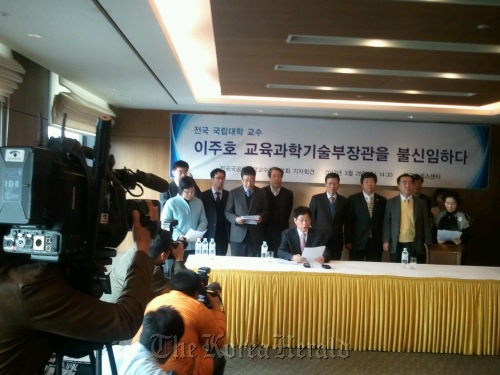Professors pass nonbinding no-confidence motion against education minister
Public universities are facing unprecedented government pressure to reform their leadership structures and staff evaluations.
The Education Ministry seeks to abolish professors’ direct election of university presidents and replace seniority-based professor evaluation with a merit-based system. It argues that direct presidential election has caused election irregularities and that merit-base evaluation is needed to foster academic competition among professors.
But public university professors oppose the new measures, though some schools have already succumbed to the pressure.
Last week, an overwhelming number of professors expressed their opposition with a no-confidence vote against the education minister.
Some 93 percent of 9,473 state-funded university professors cast no-confidence votes. They account for 72.5 percent of the total public university faculty.
“The result of the vote shows that a majority of public university professors oppose the government’s public university reform plan and proves that the plan was one-sided and forced,” said the Korea Federation of National University Professor Associations in a statement last week.
Still, the Education Ministry has seen some success in its reform drive, pressing universities to reform or face cuts in government subsidies.
The ministry on Wednesday signed an MOU on the reform measures with six national universities, followed by five more on Friday.
“The reform measures are intended to strengthen the competitiveness of public universities so that they can effectively cope with the fast-changing education environment. Schools will soon be challenged by a drastic fall in the population of school age children and globalization,” said an education ministry official.
Professors objecting to the reforms cite school autonomy, the need to improve the quality of education and the role universities could have in revitalizing the local economy.
 |
Lee Byung-woon (seated), professor at Pusan National University, announces at a news conference last Wednesday in Seoul that the Korea Federation of National University Professor Associtions passed no-confidence vote against Education Minister Lee Ju-ho. (Korea Federation of National University Professor Associations) |
“Currently, the direct presidential election system (in which university professors elect their presidents by vote) is guaranteed by the rules of the Educational Personnel and Staff Act. So replacing it with an indirect election will hinder the autonomy of schools,” said Lee Byung-woon, a professor at Pusan National University leading the group of professors.
He claimed that the Education Ministry was trying to force an indirect presidential election system to gain tight control of national universities by getting involved in the elections.
The Education Ministry dismisses this, saying it stems from an “improper understanding” of its reform plan. Ministry officials stress that presidential nominees will be selected by members of a school based on school regulations, not by the government.
They point out that university presidential elections have frequently been marred by irregularities. Candidates have attempted vote-buying and made costly populist pledges, straining university finances and leading to tuition fee hikes.
Professors oppose the merit-based salary system, arguing it will drive professors into reducing their teaching hours and spending more time on turning out theses and articles. They are particularly concerned that such evaluations could be focused on the quantity of papers rather than their quality.
“It will eventually undermine the quality of studies, which will degrade the level of universities,” said Lee Jeon, professor of Gyeongsang National University at a news conference to announce the result of the no-confidence vote last week.
He added that Korean universities lack a rational system of evaluating professors based on their papers and teaching skills, so that a merit-based salary system would likely widen the salary gap among professors due to unfair evaluations.
Advocates of the system argue that U.S. state universities have improved by adopting the system and fostered positive competition among faculty members.
The ministry said the merit-based salary system would eventually raise the competitiveness of state-funded universities by inducing competition and rewarding competent professors
Some say the government needs to test the waters before trying to enforce the measure.
“The government should rather let universities adopt their own faculty evaluation system that can work best for them,” said Jang Sang-hwan, professor of Gyeongsang University, in a local news report.
Some national university professors say their schools should not be treated the same as private universities.
“The goal of public universities is to nurture individual talents in each province who can contribute to the development of the local economy and provide opportunity to the poor students who can’t afford to attend costly private universities,” said Choi Nark-nyul, professor of Kumoh National Institute of Technology.
Choi said that local state-funded universities had failed to attract regional talent and revitalize the local economy, and emphasized that it was urgent to improve such institutions.
The Education Ministry, however, is confident the reforms can be implemented.
“We expect public universities to cooperate with the reform plan and become leading institutions that upgrade overall competitiveness of higher education in Korea,” a ministry official said.
By Lee Woo-young (
wylee@heraldcorp.com)








